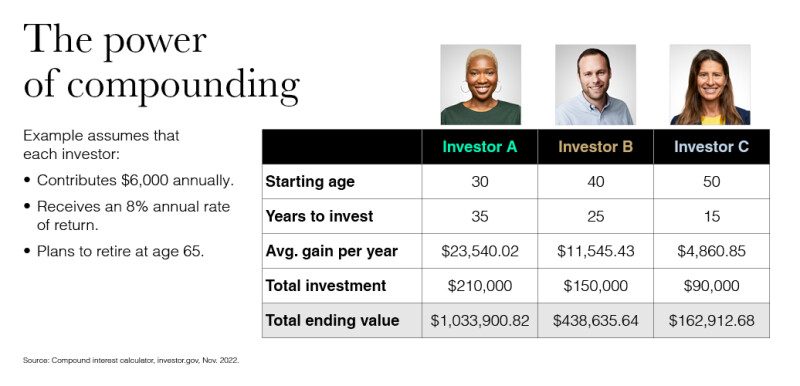Other generations may think millennials splurge on luxuries instead of having a sound financial plan. But this generation is working hard to save for homeownership and retirement—and doing so amid financial challenges that are different from those their parents faced. They've endured the Great Recession, the economic impact of COVID-19 and massive student loan debt.
Still, with the right financial planning for millennials, fiscal wellness for this generation remains within reach.
Millennials & financial planning: Why it's so important
Millennials, born between 1981 and 1996, make up the bulk of working-age people right now. Amid an inflationary economy, they're building businesses and starting families while trying not to be bogged down by debt. These are some of the challenges they're facing:
- Millennials owe, on average,
$40,438 in student loan debt. - Almost half of millennials say they
have trouble making ends meet, and 24% already have dipped into their retirement savings for a hardship or early withdrawal.
Despite these challenges, this generation has the benefit of time. It's certainly not too late to set financial goals and create action plans to achieve them.
7 pieces of financial advice for millennials
A solid financial plan includes saving, investing and paying down debt. Here are seven actions millennials can take to get started.
1. Establish a budget
It's hard to reach money goals without a spending plan. That's why a
50/30/20 budget. With this method, 50% of your take-home pay goes toward needs, 30% toward wants and 20% toward financial goals—like saving or paying down debt.
Zero-based budget. Take your monthly income, subtract your expenses and assign a spending category for what's left over. The idea is to give every dollar a purpose and ensure some of those dollars go toward financial goals.
Envelope budget . This approach involves physically separating your money into spending categories. For example, you could put cash into envelopes labeled rent, gas, groceries, dining out, etc. As you take the money out and spend it, you'll know when you've hit your limit because there won't be anything left. You also can take a digital approach and use apps that help you divvy your income into categories, place limits on them and then track your spending.
2. Make a plan for your debt
No one wants massive debt to threaten their financial future, but the truth is that not all debt is equal. High-interest debt, like credit cards, can damage your finances, especially as interest rates rise. That's why paying down this kind of
Lower-interest debt may be a nuisance, but aggressively paying it off often can take a backseat to higher-priority savings and investment goals. Federal student loans, for example, often come with low, fixed rates and repayment options that keep payments affordable as you focus on saving for retirement.
If you need an
- The
debt snowball method could work best if you want to notch progress as quickly as possible. With this method, you aggressively pay down the debt with the smallest balance while still making the minimum payment on your other debts. After you pay off one debt, you roll on to the next small balance and let the momentum keep you going.
- The
debt avalanche method might be a good fit if you're looking to save the most money in the long run. It targets decreasing the debts that are costing you the most in accumulated interest charges. For this approach, identify the debt with the highest interest rate and put more toward it per month while still paying the minimum due on other debts. After it's paid, start working to clear off your next highest-interest debt.

Should you prioritize saving or paying off debt?
In an ideal world, you'd likely try to balance both—each goal is critical for your financial future. But depending on your situation, you may have to prioritize one over the other.
3. Set short-term savings goals
Putting money aside can seem like a challenge when you're in your late 20s to early 40s. People at this life stage often are growing a family or launching a business while also trying to pay off education bills or buy a first home. But putting even a little bit toward saving for the near future is vital so that you can keep progressing toward what you want to accomplish next. It's important to
Build an emergency fund
No one can predict what medical crisis or layoff may be around the corner, so having a safety net is important. It actually can help you avoid going into more debt should you have an unexpected expense arise.
As a general guideline, you'll want at least enough in an
Start investing
If you're comfortable taking on some market risk, you can explore investment and savings options that match well with the timelines of your short-term goals.
Certificates of deposit (CDs) earn interest on a lump-sum deposit. The money is usually left alone until the maturity date. Early withdrawals may be subject to a penalty. CDs can be a great savings option if you're saving for a large purchase within the next five years—like buying a car or saving for a down payment on a home.
Money market accounts have the potential to grow your money based on a variable interest rate. Funds in a money market account are almost as easily accessible as money in a checking account. So if you need easy access to your money, this will be a sound option. But you'll likely have some limitations, such as a minimum balance requirement.
Bonds are sold by the government or corporations to raise money. When you purchase a bond, the issuer typically pays you interest once or twice a year. The face amount of the bond is paid when the bond matures. The value of a bond moves opposite of interest rates, making this an attractive option if interest rates have peaked—as rates fall, the market value of your bond will rise.
Mutual funds are investments that may return dividends based on the market's performance, making them ideal if you want the opportunity for a greater return. Although a mutual fund is considered a low-risk investment, your fund's value still can fall below the principal investment. As with other market securities, invest according to your risk tolerance.
What's your investing style?
You likely have goals for your money. How you want to use your money can factor into how much risk you can withstand. Answer seven questions to uncover how your risk tolerance shapes your investment style.
4. Build your credit
Knowing your
These steps can help you build strong credit:
- Make on-time payments. Stay current on monthly loan and credit card payments to build a positive credit history.
- Leave your oldest accounts open. You may be tempted to close a credit card you just paid off, but the longer your positive credit history, the better. Old accounts in good standing strengthen your creditworthiness.
- Don't max out your credit. Keep your credit balances low, using 30% or less of your total credit limit.
- Check your credit report regularly. Whether you check annually or quarterly, schedule time to review your report and make sure there are no errors or other items to address.
5. Make a smart homebuying plan
If you're planning to
- Research home prices. A home's value can vary based on its location, so be sure to know home prices in the area you're planning to live.
- Know the full cost of purchasing a home. Minimum down payments can range from 0% to 20% of your home loan, depending on your credit score and lender. Also factor in closing costs—money you'll pay to close on your home loan and get the deed.
- Determine how much you can afford. Use mortgage calculators to estimate your mortgage payment. This will include your principal and interest payments, along with other potential costs like homeowner's insurance, homeowner association fees or private mortgage insurance. Try to keep your total mortgage payment within 30% of your income before taxes.
- Allow time to build savings. Whether saving for a down payment or building a cushion for maintenance and repairs, give yourself time to
save for a home . Keep your money in some of the short-term savings accounts listed above so it has the opportunity to grow.
6. Don't wait to start saving for retirement
Many millennials are still 20, 30 or more years away from retirement, which means you have time to save for the future. A retirement savings account is the best place to grow your money long-term because it will benefit from
This example shows the impact that time and compounding can have on retirement savings:

These are the most common retirement accounts to have:
Take advantage of employer-sponsored retirement accounts.
Plans such as a
Consider opening a traditional or Roth IRA.
Anyone with an earned income can open a
- If you're expecting to be in a lower tax bracket in retirement than you are at the time you're contributing, you could benefit more from a traditional IRA as it comes with immediate tax benefits. With traditional IRAs, contributions may be tax-deductible and withdrawals are taxed later.1
- Roth IRA contributions are not tax-deductible, but your withdrawals of earnings may be income tax-free, so a Roth IRA may be a better fit if you're expecting to be in a higher tax bracket when you retire than at the time you're contributing.2
7. Plan for giving back to others
Charitable giving is a financial goal that's important to many millennials.
Of course, money isn't the only way to give. You also can offer your time, goods and other
Get help from an expert to make your money do more
There's a lot to consider when setting goals and creating your financial plan. Talking it through with a knowledgeable guide can make it easier to understand all your choices and opportunities for future growth.







